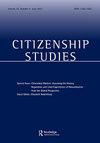成员等级制度和全球人口管理:对公民身份和种族秩序的思考
IF 1.9
3区 社会学
Q3 POLITICAL SCIENCE
引用次数: 0
摘要
摘要本文认为,思考种族主义与边界之间关系的一个有用方法是说种族主义产生了(非)公民身份的等级制度。在第一节中,我将这些论点与我与被驱逐移民家人的朋友们的研究结合起来,研究目睹被驱逐出境如何重申并产生(非)公民身份的等级制度。这些例子提供了一个追踪和理论化边界和种族形成之间动态关系的邀请。然后,我继续研究公民身份是如何在全球范围内的种族决策中集中叠加的。在那里,我将公民身份历史化为一种国际人口管理的全球制度,这表明公民身份与帝国统治下的种族做着类似的工作。总之,这两点提出了一个问题,即我们是否能够也应该为公民身份注入激进和解放的潜力。表达和庆祝非本国公民身份是一个有用的框架吗?我仍然保持谨慎,本文旨在通过从一个特定的角度来处理这个问题来强调这种谨慎——在这个角度中,种族主义的理论化和反对种族主义的斗争是核心。本文章由计算机程序翻译,如有差异,请以英文原文为准。
Hierarchies of membership and the management of global population: reflections on citizenship and racial ordering
ABSTRACT This paper argues that one useful way to think about the relationship between racism and borders is to say that racism produces hierarchies of (non)citizenship. In the first section, I work these arguments through in relation to my research with the friends of family of deported migrants, examining how witnessing deportation both reaffirms and produces hierarchies of (non)citizenship. These examples offer an invitation to trace and theorise the dynamic relationship between bordering and race-making. I then go on to examine how citizenship is centrally imbricated in race-making at the global scale. There, I historicise citizenship as a global regime for the international management of populations, suggesting that citizenship does similar kinds of work to race under empire. Taken together, these two points raise questions about whether we can and should imbue citizenship with radical and emancipatory potential. Is the articulation and celebration of non-national citizenships a useful framing? I remain cautious, and this paper is intended to underline that caution by approaching the question from one particular vantage point – one in which the theorisation of and struggle against racism is made central.
求助全文
通过发布文献求助,成功后即可免费获取论文全文。
去求助
来源期刊

Citizenship Studies
POLITICAL SCIENCE-
CiteScore
3.60
自引率
11.10%
发文量
85
期刊介绍:
Citizenship Studies publishes internationally recognised scholarly work on contemporary issues in citizenship, human rights and democratic processes from an interdisciplinary perspective covering the fields of politics, sociology, history and cultural studies. It seeks to lead an international debate on the academic analysis of citizenship, and also aims to cross the division between internal and academic and external public debate. The journal focuses on debates that move beyond conventional notions of citizenship, and treats citizenship as a strategic concept that is central in the analysis of identity, participation, empowerment, human rights and the public interest.
 求助内容:
求助内容: 应助结果提醒方式:
应助结果提醒方式:


